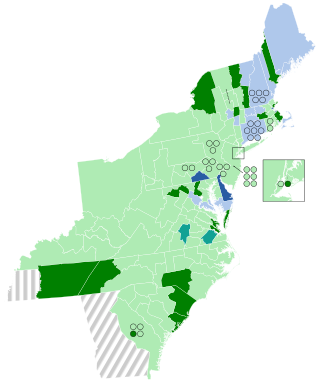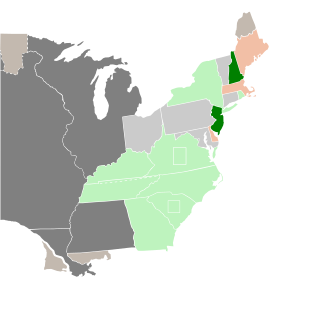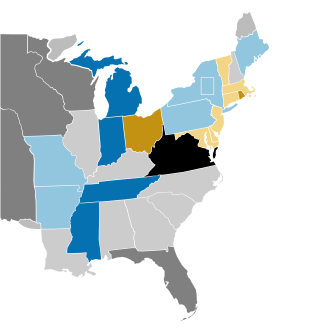A special election was held in Pennsylvania's 4th congressional district on October 8, 1805 to fill a vacancy left by the death of John A. Hanna (DR) on July 23, 1805, [1] before the first session of the 9th Congress.
| Elections in Pennsylvania |
|---|
 |
A special election was held in Pennsylvania's 4th congressional district on October 8, 1805 to fill a vacancy left by the death of John A. Hanna (DR) on July 23, 1805, [1] before the first session of the 9th Congress.
| Candidate | Party | Votes [2] | Percent |
|---|---|---|---|
| Robert Whitehill | Democratic-Republican | 6,457 | 70.7% |
| James Duncan | Independent Republican | 2,674 | 29.3% |
Whitehall took his seat December 2, 1805 [1]
John Hiester was an American military and political leader from the Revolutionary War era to the early 19th century. He was a member of the Hiester Family political dynasty.

The 1806–07 United States House of Representatives elections were held at various dates in each state between April 29, 1806 and August 4, 1807 during Thomas Jefferson's second term with the new Congress meeting on October 26, 1807.

The 1804–05 United States House of Representatives elections were held at various dates in each state between April 24, 1804 and August 5, 1805. The Congress first met on December 2, 1805. The elections occurred at the same time as President Thomas Jefferson's re-election.

James Madison Broom was an American lawyer and politician from Wilmington, in New Castle County, Delaware. He was a member of the Federalist Party, who served as a U. S. Representative from Delaware.
Thomas Jones Rogers was a Democratic-Republican member of the U.S. House of Representatives for Pennsylvania's 6th congressional district from 1818 to 1823 and for Pennsylvania's 8th congressional district from 1823 to 1824.

The 1804–05 United States Senate elections were elections that expanded the Democratic-Republican Party's overwhelming control over the United States Senate. The Federalists went into the elections with such a small share of Senate seats that even if they had won every election, they would have still remained a minority caucus.

The 1844–45 United States Senate elections were elections which, coinciding with James K. Polk's election, had the Democratic Party retake control of the United States Senate, gaining a net total of eleven seats from the Whigs.

The 1802 United States House of Representatives elections in New York were held from April 27 to 29, 1802, to elect 17 U.S. Representatives to represent the State of New York in the United States House of Representatives of the 8th United States Congress.

The 1804 United States House of Representatives elections in New York were held from April 24 to 26, 1804, to elect 17 U.S. Representatives to represent the State of New York in the United States House of Representatives of the 9th United States Congress. At the same time, a vacancy was filled in the 8th United States Congress.

Elections to the United States House of Representatives were held in Pennsylvania on October 9, 1804, for the 9th Congress.

Elections to the United States House of Representatives were held in Pennsylvania on October 13, 1812, for the 13th Congress.

Pennsylvania held its elections October 11, 1814.

A special election was held in Pennsylvania's 11th congressional district on October 8, 1805, to fill a vacancy left by the resignation of John B. Lucas (DR) before the first session of the 9th Congress to take a position as district judge for the District of Louisiana.
A special election was held in Pennsylvania's 1st congressional district on November 27, 1806, to fill a vacancy left by the resignation of Michael Leib (DR) on February 14, 1806.

A special election was held in North Carolina's 5th congressional district on August 8, 1805 to fill a vacancy left by the death of Representative James Gillespie (DR) on January 5, 1805, before the 9th Congress began, but after the general elections had taken place for the 8th Congress.

A special election was held in Delaware's at-large congressional district on October 1, 1805 to fill a vacancy resulting from the resignation of James A. Bayard, a Federalist, upon election to the Senate. Bayard had earlier served in the House in the 5th, 6th, and 7th Congresses before being narrowly defeated for re-election in 1802 by Caesar A. Rodney, whom he, in turn, defeated in 1804.

The 1804 United States elections elected the members of the 9th United States Congress. The election took place during the First Party System. The Democratic-Republican Party continued its control of the Presidency and both houses of Congress.

Special elections for the 7th and 15th congressional districts in Pennsylvania were held on November 6, 2018, following the resignations of Republican U.S. Representatives Pat Meehan and Charlie Dent.